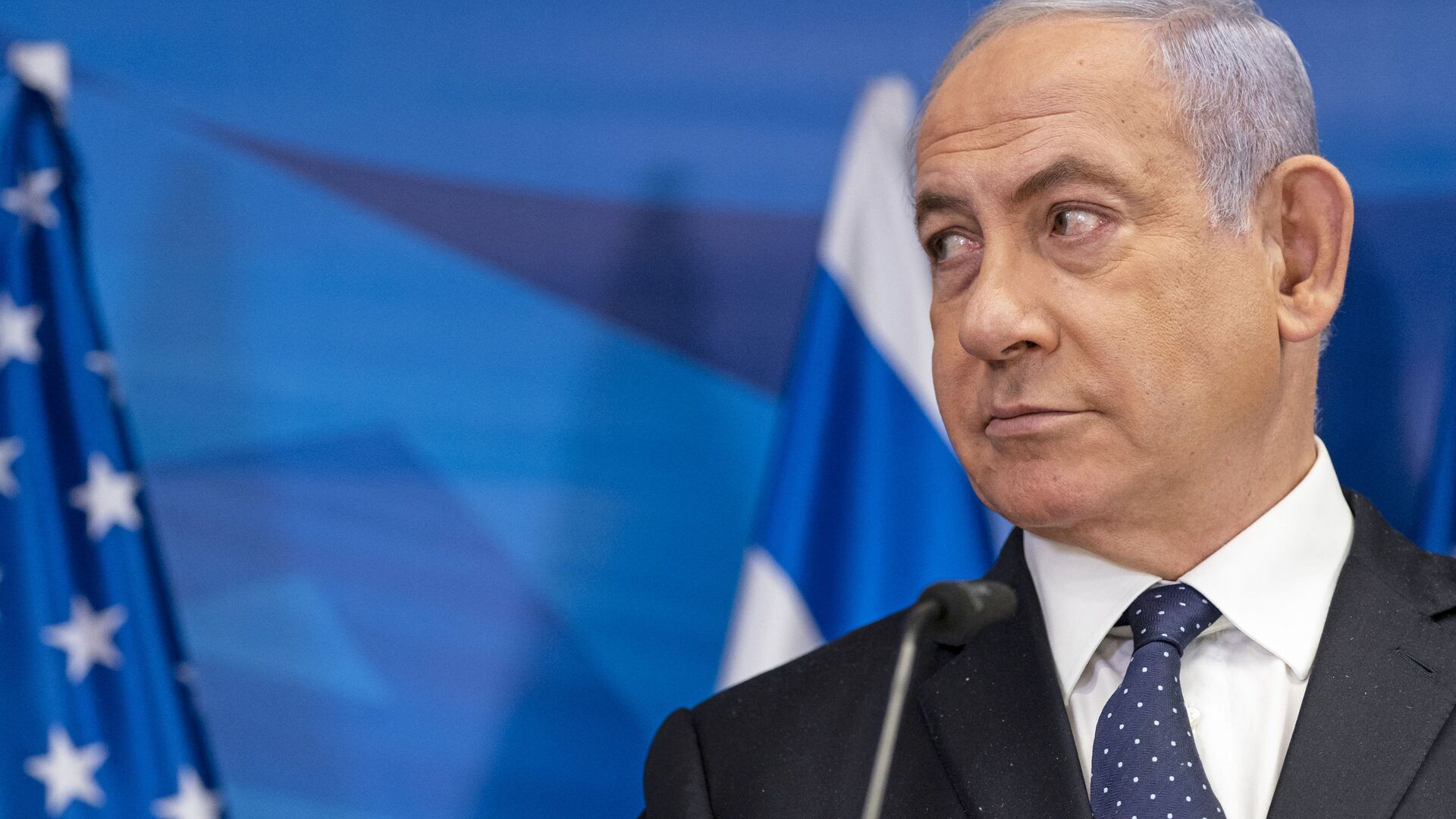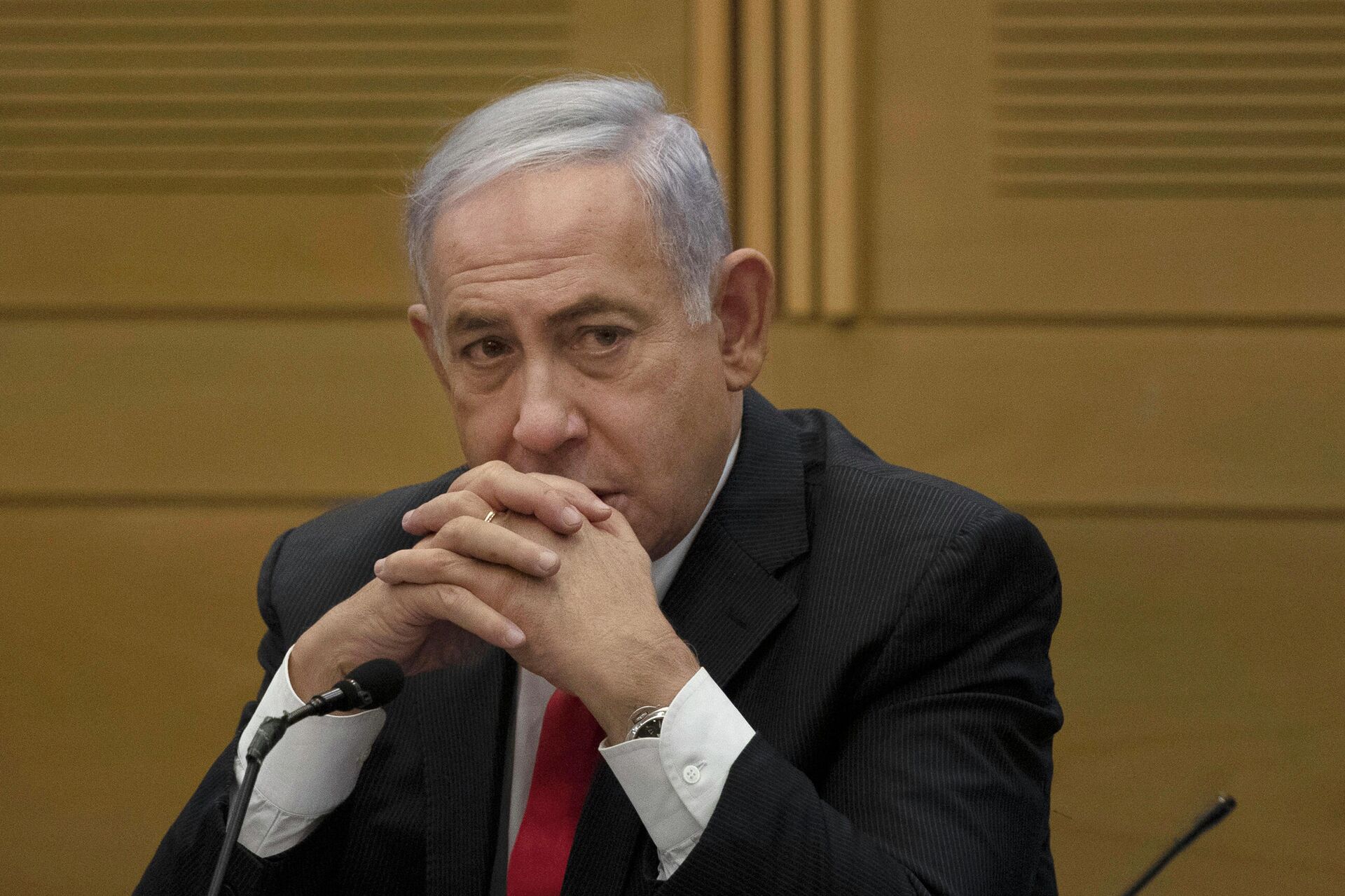https://sputnikglobe.com/20220718/netanyahu-still-faces-trial-but-he-might-end-up-winning-heres-how-1097415407.html
Netanyahu Still Faces Trial, But He Might End Up Winning, Here's How
Netanyahu Still Faces Trial, But He Might End Up Winning, Here's How
Sputnik International
Netanyahu Still Faces Trial, But He Might End Up Winning, Here's How
2022-07-18T09:52+0000
2022-07-18T09:52+0000
2023-01-15T17:26+0000
middle east
benjamin netanyahu
trial
investigation
israel
https://cdn1.img.sputnikglobe.com/img/07e5/06/02/1083061659_0:160:3073:1888_1920x0_80_0_0_77c6296596d0470dbec84e3109a8566b.jpg
On July 21, Israeli courts will go into recess; they will resume their work in the beginning of September.Fhen the Jerusalem court convenes again to hear out the witnesses in the three cases against former Prime Minister Benjamin Netanyahu, who is facing bribery, breach of trust and fraud charges in a series of graft probes.If found guilty, the ex-PM might face several years behind bars but some experts are already saying those cases have too many holes. That means that Netanyahu might get out of this trial unscathed.To better navigate through the trial, Sputnik has summed up the three cases' problematic features, which are raising eyebrows among the judiciary.Case 1000:What is it all about?According to the indictment, Netanyahu is accused of receiving gifts from two rich donors, media magnate James Packer and Hollywood producer Arnon Milchan. In exchange, it is believed he was promoting their interests and was giving them benefits in the form of tax evasion.Holes:Friendly relations - While the prosecutor has been trying to depict a picture of corruption, where Netanyahu receives pricey presents and gives out benefits in return, the defense has managed to show that relations between Netanyahu and the two businessmen were those of friends. They have been so for years, even when he was leading the opposition, Netanyahu could receive presents. It was also proven that he was giving expensive gifts in return.In addition, the quid pro quo theory seems to have cracks too. Milchan, who has approached Netanyahu regarding tax evasion, has never received any discounts. His strife to merge two Israeli media companies, Reshet and Keshet, did take place but that was in accordance with the professional recommendations of several Israeli institutions. The former PM claims the defense had no impact on their decision.Presents Law - According to legislation, a public servant cannot accept gifts, and if they do, they are obliged to pay their worth to the state. However,, the law also stipulates that if permission is granted by relevant bodies, presents can be accepted, and the defence of Netanyahu has shown that he obtained the necessary approvals from the regulatory bodies and legal advisors.Another interesting line of the defense is that the total value of presents given to Netanyahu over the years is estimated at slightly more than 200,000 NIS or roughly $60,000, and this is definitely less than the presents ex-PM Ehud Olmert received but has never faced indictment for.Illegal Evidence - The defense has already shown that more than 250 pieces of evidence in case 1000 have been collected illegally, that is, prior to the time when the State Attorney gave his permission to open a probe into the affair. The lawyers of Netanyahu are also claiming that some eyewitnesses in this case have been coached by the police, something that strengthens Netanyahu's own claims that the trial has been aimed at railroading him and oust him out of office.Case 2000:What is it all about? Here Netanyahu is accused of illegal dealings with Arnon Mozes, the owner of one of Israel's daily papers, Yedioth Ahronot. The indictment says the ex-PM promised to weaken the strength of his competitor, the daily news outlet Israel Hayom. In exchange, he would get positive coverage in all Yedioth Ahronot platforms.Holes:Illegal Evidence - just as it was in the case of case 1000, some pieces of evidence were collected prior to the time of an official permission. The phones of key players in the affair have been bugged, eyewitnesses pushed to a corner and documents have been filed, something that Netanyahu's defense capitalizes on saying the police was biased and aimed at persecuting the ex leader.No Quid Pro Quo -- the Prosecution will find it is hard to prove that Netanyahu has received something in return from Mozes. To start off, Yedioth has never presented Netanyahu and his family in a good light, says the defence. During the time of the alleged illegal dealings, the coverage has been even worse. Secondly, in 2017, Netanyahu was eventually the one, who hampered the passage of the law that aimed at weakening Israel Hayom and that would damage its distribution. According to the defence, that shows that he was acting in the interests of the public pursuing freedom of speech, not his personal interests.Principal Problem of Coverage -- case 2000 is considered unprecedented in Israel. The reason for this is the fact that politicians often deal with media to deliver their messages or use the various news outlets as a platform. Netanyahu was not an exception and the defense has been trying to show that if he stands trial for such an affair, others, including the current PM Yair Lapid, should face trial as well.Case 4000:What is it all about? This case is considered to be the most serious out of the three. Here, Netanyahu is accused once again of quid pro quo dealings. According to the indictment, the former PM helped the owner of an Israeli telecommunications company Bezeq Shaul Elovitch to merge with another firm, Yes. In exchange, the businessman improved Netanyahu and his family's image on the news website he owns, Walla.
israel
Sputnik International
feedback@sputniknews.com
+74956456601
MIA „Rosiya Segodnya“
2022
News
en_EN
Sputnik International
feedback@sputniknews.com
+74956456601
MIA „Rosiya Segodnya“
Sputnik International
feedback@sputniknews.com
+74956456601
MIA „Rosiya Segodnya“
netanyahu still faces trial, but he might end up winning, here's how
netanyahu still faces trial, but he might end up winning, here's how
Netanyahu Still Faces Trial, But He Might End Up Winning, Here's How
09:52 GMT 18.07.2022 (Updated: 17:26 GMT 15.01.2023) The former PM stands accused of receiving gifts from rich donors, as well as using his position to advance his personal interests and get positive media coverage, allegations Netanyahu denies.
On July 21, Israeli courts will go into recess; they will resume their work in the beginning of September.
Fhen the Jerusalem court convenes again to hear out the witnesses in the three cases against former Prime Minister Benjamin Netanyahu, who is facing bribery, breach of trust and fraud charges in a series of graft probes.
If found guilty, the ex-PM might face several years behind bars but some experts are already saying those cases have too many holes. That means that Netanyahu might get out of this trial unscathed.
To better navigate through the trial, Sputnik has summed up the three cases' problematic features, which are raising eyebrows among the judiciary.
According to the indictment, Netanyahu is accused of receiving gifts from two rich donors, media magnate James Packer and Hollywood producer Arnon Milchan. In exchange, it is believed he was promoting their interests and was giving them benefits in the form of tax evasion.
Friendly relations - While the prosecutor has been trying to depict a picture of corruption, where Netanyahu receives pricey presents and gives out benefits in return, the defense has managed to show that
relations between Netanyahu and the two businessmen were those of friends. They have been so for years, even when he was leading the opposition, Netanyahu could receive presents. It was also proven that he was giving expensive gifts in return.
In addition, the quid pro quo theory seems to have cracks too. Milchan, who has approached Netanyahu regarding tax evasion, has never received any discounts. His strife to merge two Israeli media companies, Reshet and Keshet, did take place but that was in accordance with the professional recommendations of several Israeli institutions. The former PM claims the defense had no impact on their decision.
Presents Law - According to legislation, a public servant cannot accept gifts, and if they do, they are obliged to pay their worth to the state. However,, the law also stipulates that if permission is granted by relevant bodies, presents can be accepted, and the defence of Netanyahu has shown that he obtained the necessary approvals from the regulatory bodies and legal advisors.
Another interesting line of the defense is that the total value of presents given to Netanyahu over the years is estimated at slightly more than 200,000 NIS or roughly $60,000, and this is definitely less than the presents ex-PM Ehud Olmert received but has never faced indictment for.
Illegal Evidence - The defense has already shown that
more than 250 pieces of evidence in case 1000 have been collected illegally, that is, prior to the time when the State Attorney gave his permission to open a probe into the affair. The lawyers of Netanyahu are also claiming that some eyewitnesses in this case have been coached by the police, something that strengthens Netanyahu's own claims that the trial has been aimed at railroading him and oust him out of office.
What is it all about? Here Netanyahu is accused of illegal dealings with Arnon Mozes, the owner of one of Israel's daily papers, Yedioth Ahronot. The indictment says the ex-PM promised to weaken the strength of his competitor, the daily news outlet Israel Hayom. In exchange, he would get positive coverage in all Yedioth Ahronot platforms.
Illegal Evidence - just as it was in the case of case 1000, some pieces of evidence were collected prior to the time of an official permission. The phones of key players in the affair have been bugged, eyewitnesses pushed to a corner and documents have been filed, something that Netanyahu's defense capitalizes on saying the police was biased and aimed at persecuting the ex leader.
No Quid Pro Quo -- the Prosecution will find it is hard to prove that Netanyahu has received something in return from Mozes. To start off, Yedioth has never presented Netanyahu and his family in a good light, says the defence. During the time of the alleged illegal dealings, the coverage has been even worse. Secondly, in 2017, Netanyahu was eventually the one, who hampered the passage of the law that aimed at weakening Israel Hayom and that would damage its distribution. According to the defence, that shows that he was acting in the interests of the public pursuing freedom of speech, not his personal interests.
Principal Problem of Coverage -- case 2000 is considered unprecedented in Israel. The reason for this is the fact that politicians often deal with media to deliver their messages or use the various news outlets as a platform. Netanyahu was not an exception and the defense has been trying to show that if he stands trial for such an affair, others, including the current PM Yair Lapid, should face trial as well.
What is it all about? This case is considered to be the most serious out of the three. Here, Netanyahu is accused once again of quid pro quo dealings.
According to the indictment, the former PM helped the owner of an Israeli telecommunications company Bezeq Shaul Elovitch to merge with another firm, Yes. In exchange, the businessman improved Netanyahu and his family's image on the news website he owns, Walla.




